Soft Cell - Interview
by John Clarkson
published: 31 / 7 / 2008
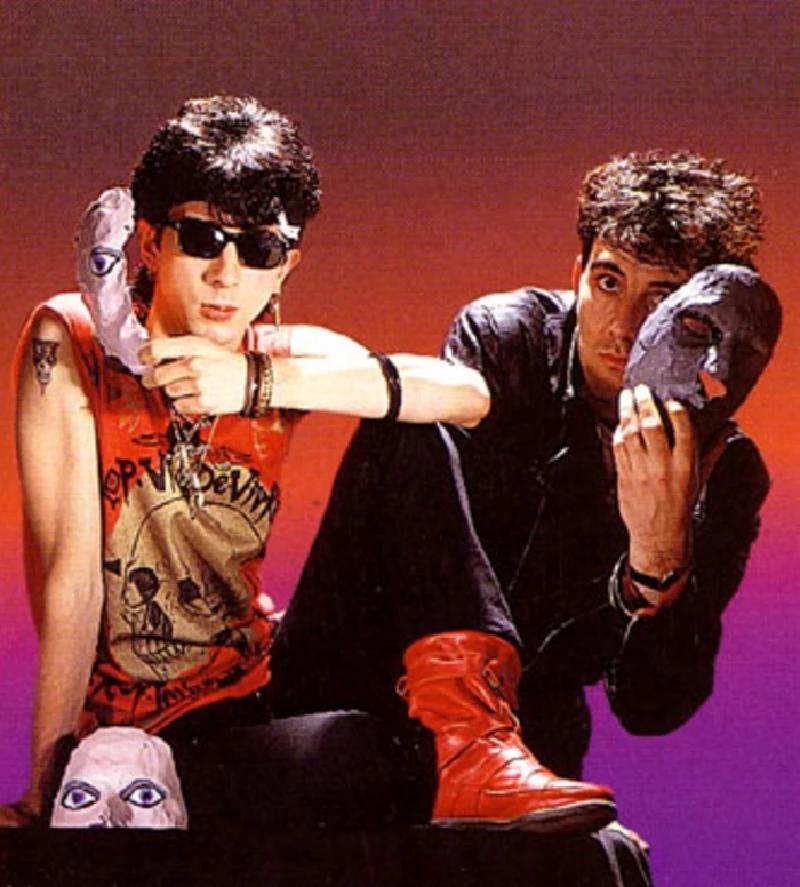
intro
One of the best known and most controversial acts of the early 80’s, Soft Cell are about to release 'Heat', a double CD of remixes. John Clarkson talks to Dave Ball from the duo about his long musical relationship with Marc Almond and the band's history
Soft Cell were one of the best known acts of the early 80’s. A minimalistic electronic duo, the group, which consisted of Marc Almond (vocals) and Dave Ball (synthesizers, drum programming) formed in Leeds in 1979. Almond and Ball released their first EP together, ‘Mutant Moments’, the following year on their own Big Frock Records in a limited edition of 2000, before signing shortly afterwards to teenage entrepreneur Stevo Pearce’s fledgling Some Bizzare label. The major label Parlophone in a deal with Pearce, who had become Soft Cell’s manager, and Some Bizzarre released the band’s debut single, ‘Memorabilia’, in March 1981, and then in July of that year its follow-up, ‘Tainted Love.’ A cover of an obscure 1964 Northern Soul number by Gloria Jones, who would go on to become the last girlfriend of Marc Bolan, it climbed up the charts to No 1 in the UK charts, catapulting Soft Cell to instant fame. It would go on to become the bestselling single of that year, and would also go on to be No 1 in several other countries. The group’s debut album, ‘Non Stop Erotic Cabaret’, which was released at the end of 1981, also did well. A remix album, ‘Non Stop Ecstatic Dancing’, followed in the summer of 1982. Soft Cell, however, had a knack for attracting trouble and controversy. Openly gay, Almond became the target of much bile in the more conservative elements of the media and rock press. His lyrics showed a fascination with a world of vice, and bondage, call girls, dominatrixs and transvestites, and the footage for a video for an album track ‘Sex Dwarf’, which was shot in a bloody butcher’s and involved chainsaws and nude actors, was seized by the police and confiscated. The fatalistic title of the group’s second album, ‘The Art of Falling Apart’, which emerged in early 1983,alone however, hinted that all was not well, and a month prior to the release of Soft Cell’s third album, ‘This Last Night in Sodom’, Almond and Ball, who had both already begun solo projects, announced that they were splitting. In the time after the break-up, Almond established a lucrative solo career, while Ball busied himself with the Grid, an electronic dance duo which he had formed with former music journalist Richard Norriss. Both Almond and Ball, however, always stayed in touch, and in 1991 the Grid appeared on some of tracks of ‘Tenement Years’, a Marc Almond solo record. A full-scale Soft Cell reunion tour took place in 2001, and was followed by an album, ‘Cruelty With Beauty’, which came out on Some Bizzare, in 2002. Soft Cell’s most recent project is ‘Heat : The Remixes’, a double CD collection of classic album and single tracks from between 1981 and 1984, which have been remixed by acts such as the Nitewreckers, Cicada, Marcus Lancaster, Richard X, Manhattan Clique, Kinky Roland and Yer Man as well as Almond and Ball themselves. Dave Ball spoke to Pennyblackmusic about Soft Cell’s history and the remixes project. PB : You and Marc Almond first met at Leeds Polytechnic. Can you remember much about how you first got together ? DB : Marc was the first person that I met there. I was about to register as a student. Marc had been there for a year before I had and I saw this guy standing there, wearing gold jeans, and I thought, "He’s got to be an art student." I was looking for the place where you registered and so I went over and I spoke to him just to find out where to go. That was our first meeting. Marc was into performance art. Leeds Poly was very famous at that time in the late 70’s for its performance art. It also had this very basic recording room, and I had just bought my first synthesizer, and used to go in there with it a lot. He used to go past and hear these weird electronic noises that I was moodling around with, and one day he came in and he asked me if he could use some of my music when he was doing some of his performance work. That was our next meeting and how we originally got together. PB : Had you only been playing synthesizers for a few months at that stage ? DB : Yes, the first electronic instruments I had got were a couple of stylophones. That was all I could afford, and then I came into a little bit of money and I bought an old Korg machine that had funnily enough belonged to the drummer out of Jethro Tull. PB : Did you both start writing material straight right away ? DB ; My idea of pop music was very bleepy minimal songs about tupperware parties and very mundane things. I was into that whole reality thing of the time, and Marc heard some of them and said, "Can I sing some of them ?" and I said, "Yeah. Why Not ? You’ve got a better voice than me." That is how Soft Cell came really about that. PB : You were originally writing lyrics then as well as tunes. Did you both write the lyrics at first or did Marc soon take over writing all of the lyrics ? DB : There were certain early songs for which I wrote the lyrics. ‘A Man Can Get Lost’, the B side of ‘Memorabilia’ is one that I wrote. ‘Facility Girl’, the B side of ‘Bedsitter’, is another one that I wrote, but when Marc came in it really raised the stakes. He is a much better lyricist than I am as well as a great singer and from those early beginnings it developed, and then eventually I said, "Why don’t you write all the words ?" and that took it to a new level. PB : How long after that did the first EP , ‘Mutant Moments’, come out ? DB : It was early 1980. It was financed by my Mum (Laughs). PB : Did she take a lot of persuasion to give you the money ? DB : No. She was always very encouraging. PB : Your first proper single, however, was ‘Memorabilia'. It was released as a collaboration between Phonogram and the independent label Some Bizzare. How did that collaboration come about ? DB : Basically we had done the Futurama Festival in Leeds , which featured acts like Siouxsie and the Banshees and Robert Fripp. I think we were the first band on. and Stevo who was just forming Some Bizzare hadn't actually gone to it. He, however, talked to some of his friends who had been there and they told him about us. He launched the label with a compilation ('Some Bizzare Album'-Ed) and, God bless his heart, put us on it. It also featured Depeche Mode, Blancmange and The The. PB : That is pretty much every major independent act of the early 80's ... DB : It wasn't bad A and R for a 17 year old kid, was it ? Then he licensed that through Phonogram and got us a deal as a result to do ‘Memorabilia’. Phonogram were pretty nippy. They were like, "Oh, it’s been a big club hit, but it wasn’t a big chart hit." They were more interested in another of the bands on the compilation, B Movie. They had thought we were going to be the new Duran Duran, which we obviously weren’t, and Stevo had to really beg them to allow us to do a second single. Then we did ‘Tainted Love’. One week they wouldn’t let us in the building pretty much, and then the next week it was like, "Oh, guys ! Come in and have some champagne." That is like how real some of these people are (Laughs). It was the biggest-selling record of the year. It was Number 1 in something like seventeen countries. PB : That must have totally taken you by surprise. DB : It took everyone by surprise. We just wanted to have cult or underground status. It was bonkers. We were living in a council house. Then suddenly it was like, "Oh, your tickets for concorde are here", and so we were flying off to New York PB : It must have been quite difficult to deal with. DB : Yeah, it took a while. I don’t think we ever dealt with it really (Laughs). Such is the crazy world of music. PB : Is it true that because ‘Tainted Love’ was a cover and its B side, which was the Supremes song, ‘Where Did Our Love Go ?’ was also a cover, you didn’t receive very many royalties for it ? DB : The thing was we weren’t savvy with the music business. Marc and I weren’t and Stevo wasn’t. He was a very young guy to be a manager and we didn’t expect to be that massive. It wasn’t done in a cynical or money making way. If we had written the B side, we would have been fucking multi millionaires. PB : There has been various covers over the years of ‘Tainted Love’ in particular, but also other Soft Cell songs. They have been covered by a very wide bunch of people including Marilyn Manson, Nine Inch Nails, the Inspiral Carpets and the Pussycat Dolls. How do you feel about some of those covers ? DB : David Gray's version of ‘Say Hello, Wave Goodbye’was brilliant. Most of the time I am not really bothered one way or the other though. I still think Gloria Jones' version of 'Tainted Love' is the best. I think ours and Gloria’s is the best. Marilyn Manson basically covered Soft Cell as supposed to ‘Tainted Love’, but it was a nod in the right direction. No one would ever have heard that track if we hadn't done it. We did it because I was a Northern Soul fan. It was me that heard it first. It was my idea to do it, and then when Marc heard it he said, "Oh, those lyrics are really brilliant". PB : There was a very eclectic range of influences that went into Soft Cell, wasn't there ?. DB : I think my main influence came in 1975. I was collecting Northern Soul and going to clubs like Wigan Casino and the Highland Rooms at the Blackpool Mecca and it was the same year that Kraftwerk released ‘Autobahn’. So I was really into Northern Soul and then suddenly I heard this electronic sound, and it was like boom. Something huge went off in my head. Marc was very much into the Berlin cabaret thing, the torch singer thing, and so I suppose the combination of that equalled Soft Cell. PB : How long after ‘Tainted Love’ did ‘Non Stop Erotic Cabaret’ come out ? DB : It came out in the same year. As soon as 'Tainted Love' came out, we were flown out to New York where we worked with Mike Thorne and then put that album together in six weeks. We had two hundred songs and we whittled it down to what we felt were the best. That was how it evolved really. PB : You must have been very prolific songwriters because you had only been together a couple of years at that stage. DB : Well, Marc was like a lyric machine and I would write five or six tunes a day, even just rough ideas, like melodies or bass lines or whatever. We both just worked constantly. That was all I did all day. I would get up in the morning, switch on my tape recorder, start my synthesizer and do some of my minimalistic melodies. PB : That first album seemed to suggest that there was a lot of drugs going on, that you were hanging around Soho a lot in porno cinemas and having lots of brief sexual encounters. Were your or Marc's lifestyles anything like that ? DB : We were basically two young lads living in Leeds who suddenly found ourselves in Soho. It was more like a curiosity thing. We weren't actually participating in anything. We would go to places like the Naked City Cinema and just like get the sort of vibe of it. We were like sex tourists but without doing the sex (Laughs). We were kind of like, "Wow ! This is really exciting. What's going on here ?" We just loved the imagery and the sleaziness. It was more an artistic thing. It wasn't a sexual thing (Laughs). PB : It seems quite an innocent album, while in contrast both 'The Art of Falling Apart' and 'This Last Night in Sodom' are both much darker in tone. DB : It is true, but actually the title track of 'The Art of Falling Apart' was written while we were at college. We decided to call it that because my relationship at that time was falling apart and stuff. PB : You had said already that you had written two hundred songs by the time 'Non Stop Erotic Cabaret' came along. Were you continuing to write songs so prolifically at the time of those last two albums or with all the touring and promotional work you must have had to do now did it cut down on the amount of writing that you could do ? DB : It was always on going. The time thing was a factor, but we also had a really good backlog of stuff that we wanted to get out. Some of the stuff was written at the time, but other songs on 'The Art of Falling Apart' came from when we were at college. It wasn't just the title track. 'Martin' was another one. By the time we got to 'This Last Night in Sodom' we were both dealing with serious drug issues, the usual crap, and we were absolutely exhausted because we were touring and recording all the time and living the usual Spinal Tap lifestyle. We were angry and fed up with record company and fed up with everything and that was our fuck the rest of the world album really (Laughs). PB : You were dealing as well with a lot of backlash from the media by that point. You were one of those bands they had built up and then started knocking down. Do you think that in some ways contributed to you breaking up as well ? DB : I don't really read the press to be quite honest with you. It doesn't really bother me because it is just like someone's opinion. I think it was more down to we were just absolutely knackered. If we had more sophisticated management which had said, "Take a year out", then we would have probably stayed together. We were just like slaves. We were working all the time and we had got into the party scene and all the naughty stuff. It takes its toll. PB : Do you see yourself as a band that perhaps achieved too much too soon ? DB : Yeah, I would agree with that. If your first big record is Number 1, where do you go from there ? It is a tough one to live up too. I remember when we did 'Bedsitter', which followed 'Tainted Love', we were absolutely shitting ourselves. We were like, "Is it going to get into the Top 5 ?". Our run of success, however. continued with that obviously ('Bedsitter' also entered the Top 5 ('4), as did Soft Cell's next three singles, 'Say Hello, Wave Goodbye' ('2'), 'Torch' ('2') and 'What' ('3')-Ed). Without pointing a figure, and with all due respect to Stevo because he was younger than us, for us to be able to deal with amount of success I think we needed someone with a bit more savvy and experience. No one knew what was going to happen and so no one is to blame, but maybe they would have been able to cope with it better. PB : There were various controversies. The first 'Sex Dwarf' video in particular caused something of a stir. Did you set out to be deliberately controversial with that ? DB : Yeah, we were the electronic Sex Pistols (Laughs).We did it for a laugh basically. It wasn't like it was a single. It wasn't like we were the Prodigy doing 'Smack My Bitch Up'. It was only for a video collection of our tunes, 'Non Sop Exotic Dancing', which we were putting together, so we got some real hookers in and some real trannies in. The irony of it, however, was that that title came from a headline from 'The News of the World' and then a year later we're the headline in 'The News of the World' because we've used their headline (Laughs) and we have been raided by the vice squad. If you look at the music business these days, it is really bland. That is why I love Amy Winehouse. At least she shakes things up. That is what music is meant to do. I like the fact that she is such a rock 'n' roller. I hope that she doesn't kill herself. God bless her ! And that's why I love Pete Doherty. I don't particularly like his music, but I like him. At least these people are doing the rock 'n' roll thing. If you are going to attract my interest, I don't want some kind of squeaky clean kid. I think that is what Soft Cell were like and I think that is what separated us a lot from a lot of those other 80's bands. It was always the danger element that we were interested in and it fucked us up in a way, but I think that element of danger is important in music. PB : There was a time after that in which Marc wouldn't play Soft Cell songs in concert. I remember going to see him in '85 at a solo show and some of the audience were shouting out for 'Tainted Love' and 'Say Hello, Wave Goodbye' ". He eventually got tired of this and turned on someone who was being especially loud and told him, "Soft Cell was over two years ago. I am doing this now. I have moved on. I suggest you do." Did you feel the same way ? Did you want to put Soft Cell behind you for a while ? DB : I got into doing other stuff as Marc did, and I started the Grid which was not as successful as Soft Cell was, but did pretty well. I just wanted to focus more on making music without vocals because it was always like I was providing the backdrop for Marc, whereas with the Grid the focus was more on making instrumental music if you see what I mean. It was good for both of us really and then we collaborated again (Laughs). PB : What lead to the full-scale reunion tour and the 'Cruelty With Beauty' album ? DB : I had my own studio over in west London and Marc had phoned me up and said, " Do you want to write some songs together ?", and I said, "That would be great. I haven't seen you in ages." We were thinking about just writing for other people and then Marc was sort of demoing the vocals and we looked at each other and said, "Hang on. It is Soft Cell, isn't it really ?" (Laughs). It just kind of evolved really. There was no kind of big plan to get back together. We just began by writing songs. It was just good fun to be working together again. We hadn’t planned to get back together as Soft Cell. That is kind how I like things to happen. I do plan things if there are plans, but it wasn’t like a cynical oh-we-must-get-back-together and do one of these horrible 80’s package tour things or something. We have always resisted those. It was totally organic. There was no we must get back together and do the reunion shit. I can’t do with all that sort of stuff. I like things to happen as they happen as does Mark. PB : Why did that reunion come to an end ? DB : It only came to an end because of Marc’s tragic accident (While fully recuperated now, Marc Almond was badly injured and almost killed in a motorbike accident in which he was the pillion passenger in 2004-Ed). We have since recorded some stuff together and we’re talking about doing some more stuff, whether it be as Marc’s stuff or as Soft Cell. Who knows ? I don’t like to plan too far ahead, but we are always keen to work together because there is obviously still some sort of magic between us which works. No one is pressurising anyone though, and certainly not anyone from record company land. If anything happens it will come from us and because we want to do it and not because we are being told to do so. PB : Why have you decided to put out the ‘Heat’ remixes now ? DB : When is a good time or a bad time to put out remixes ? I don’t know. Remixes are the never the same as the originals. It was an idea that originated from Stevo, and Chris Smith who has been doing a lot of the liaison work on this record. Chris is a massive fan and really enthusiastic. PB : You have obviously done a lot of remixes with Soft Cell in the past, and especially on the ‘Non-Stop Ectastic Dancing’ album. Why have you decided to concentrate on the years between’81 and ’84 for these remixes ? You have since done ‘Cruelty With Beauty’ as well. Why did you decide to not remix some of that ? DB : That is down to politics. All of the stuff on the remix is in the Phonogram catalogue. It is to do with record company politics. PB : Did you and Marc have much say over who was going to remix the records or was that the record company ? DB : There were various remixes that were rejected or that we didn’t like. I won’t mention any names. Between us Chris and I have been monitoring everything that has gone on it. A lot of people have been saying, "Oh, why didn’t you get some bigger names to do it ?" But it has been good to get up-and-coming people to do it. We talked to people like the Scissor Sisters and the Pet Shop Boy and they all said yes, but it was just like, "It’s a cliché. Why don’t we get some new kids on the block ?”. That music is so established already. The originals are always going to be like the originals and so it doesn’t really matter who remixed it as long as it sounds good. We just wanted good versions of them. I liked the reinterpretations and some of them veer away more from the originals than others. Others of them are quite true to them PB : What are you favourite tracks on the remix compilation ? DB : My two favourite tracks are ‘Memorabilia’, which has been remixed by Cicada and the Nitewreckers.’ Baby Doll’, which is for me the definitive version. I played the guitar for it myself for them and it has got the anger I always wanted on it. It has got the power I wanted on the original but which I was never able to get .Now that we have got it well you can hear how angry that track sounds ‘Baby Doll’ and ‘Martin’, both of which are on ‘The Art of Falling Apart’, are probably my favourite Soft Cell tracks. PB : After you have released the CD, what happens then ? You have got a new Grid album, ‘Doppelganger’, to promote as well at the moment. DB : The new Grid album has been very poorly promoted. We are gigging. We did Glastonbury and we did the Glade and the Big Chill and then we are off to Moscow. I think that next year is going to be a much bigger year for the Grid. We are doing a lot more European dates and festivals. As far as Soft Cell, I can’t say what is happening. Marc and I are going to work together soon. There are various shenanigans going on with lawyers. It is nothing too serious. The usual bullshit (Laughs). PB : Thank you very much for your time.
Band Links:-
https://www.softcell.co.ukhttps://www.facebook.com/softcellband/
https://twitter.com/softcellhq
Have a Listen:-
Picture Gallery:-
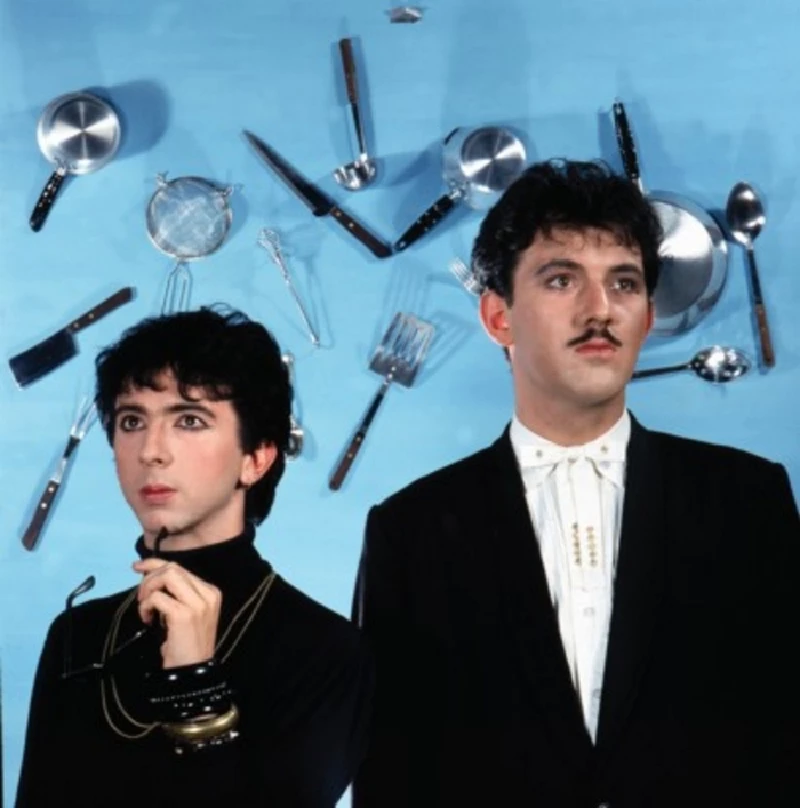
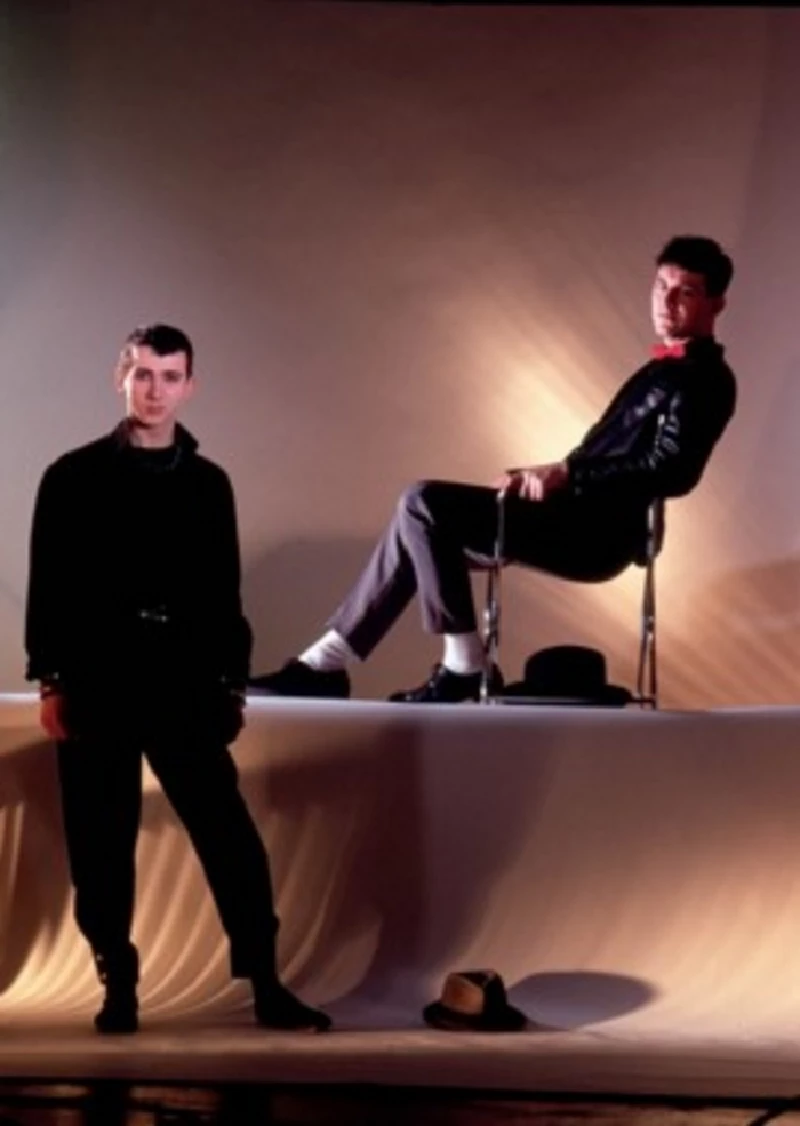
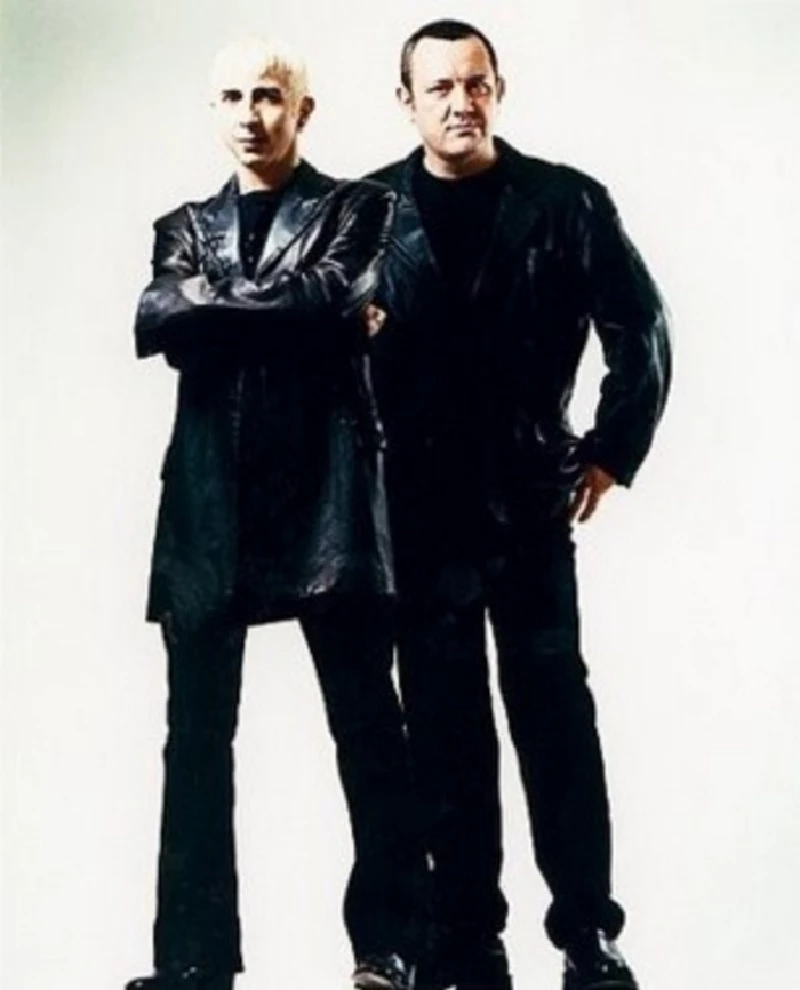
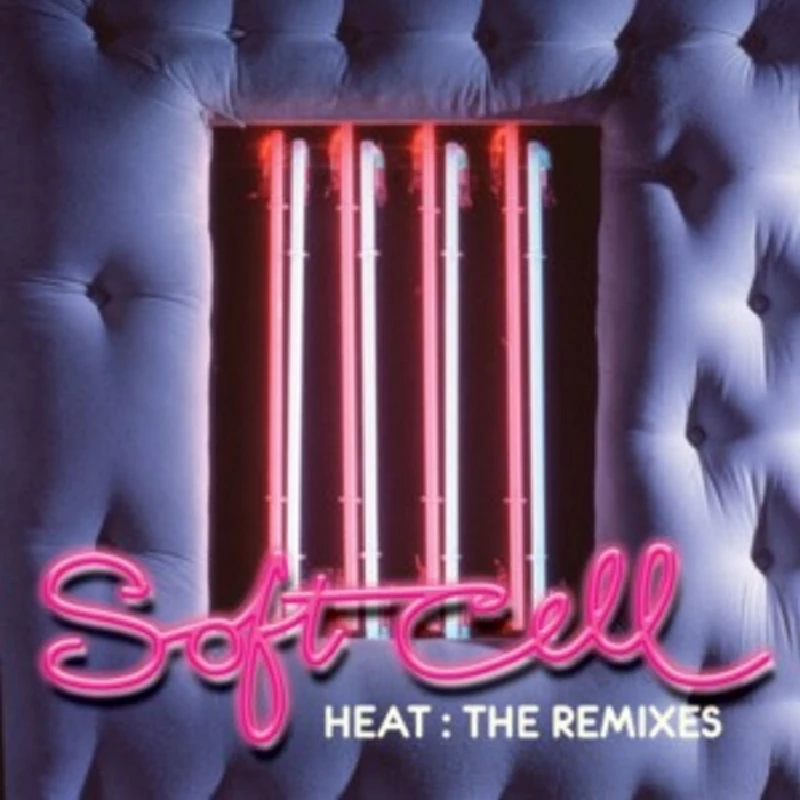
interviews |
|
Interview with Dave Ball (2019) |
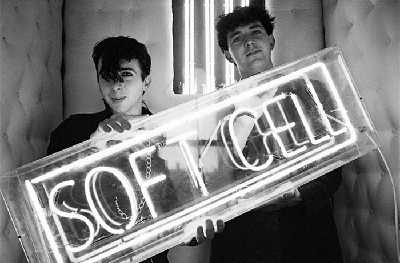
|
| Soft Cell keyboardist Dave Ball speaks to John Clarkson about the influential synthpop group's history and their new photograph book, ‘To Show You I’ve Been There’. |
soundcloud
reviews |
|
Happiness Not Included (2022) |

|
| Excellent fifth album from groundbreaking 80's synth duo Soft Cell |
most viewed articles
current edition
Carl Ewens - David Bowie 1964 to 1982 On Track: Every Album, Every SongSimian Life - Interview
the black watch - Interview
John McKay - Interview
Editorial - July 2025
Billie Eilish - O2 Arena, London, 10/7/2025
Armory Show - Interview with Richard Jobson
Hothouse Flowers - Photoscapes
Bathers - Photoscapes 2
Cleo Laine - 1927-2025
previous editions
Trudie Myerscough-Harris - InterviewPixies - Ten Songs That Made Me Love...
Boomtown Rats - Ten Songs That Made Me Love....
Fall - Hex Enduction Hour
Heavenly - P.U.N.K. Girl EP
Sam Brown - Interview Part 2
Place to Bury Strangers - Interview
Miscellaneous - Charity Appeal
Madness - One Step Beyond
And Also The Trees - Eventim Apollo, London, 21/12/2014.
most viewed reviews
current edition
Amy Macdonald - Is This What You've Been Waiting For?Sick Man of Europe - The Sick Man of Europe
Phew, Erika Kobayashi,, Dieter Moebius - Radium Girls
Alice Cooper - The Revenge of Alice Cooper
Lapsley - I'm a Hurricane, I'm a Woman In Love
Davey Woodward - Mumbo in the Jumbo
Philip Jeays - Victoria
Blueboy - 2
Lucy Spraggan - Other Sides of the Moon
Cynthia Erivo - I Forgive You
related articles |
|
Marc Almond: Photography (2017 |

|
| Keith Ainsworth photographs Marc Almond at a show at Warringon Parr Hall on his latest UK tour |
Pennyblackmusic Regular Contributors
Adrian Janes
Amanda J. Window
Andrew Twambley
Anthony Dhanendran
Benjamin Howarth
Cila Warncke
Daniel Cressey
Darren Aston
Dastardly
Dave Goodwin
Denzil Watson
Dominic B. Simpson
Eoghan Lyng
Fiona Hutchings
Harry Sherriff
Helen Tipping
Jamie Rowland
John Clarkson
Julie Cruickshank
Kimberly Bright
Lisa Torem
Maarten Schiethart